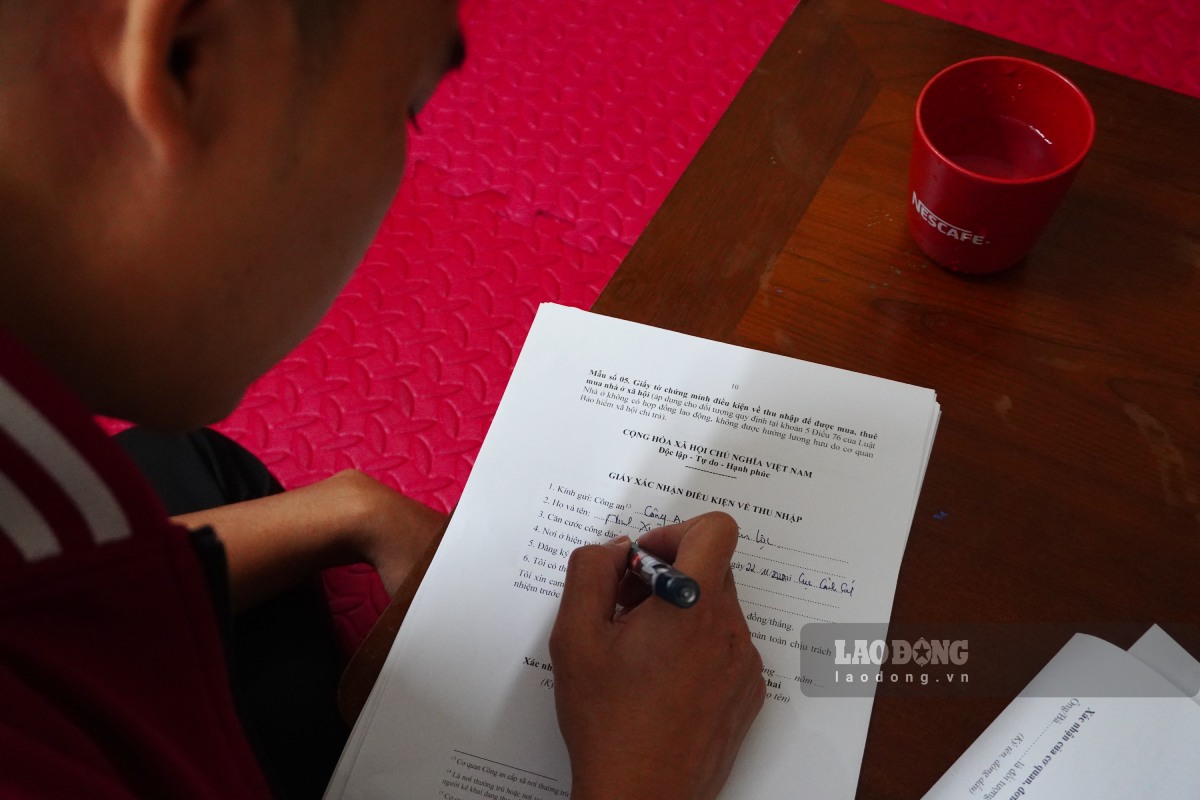According to current regulations, low-income people in urban areas but do not have a labor contract must prove their income level and have confirmation from the police at the commune level where they are residing, temporarily residing or living. However, in reality, many freelance workers are having trouble right at this stage of income confirmation.
Ms. Hoang Lich (Hanoi) said that she is completing the documents to submit to the CT3 Kim Chung social housing project. Up to now, she has gone to the ward three times to request an income confirmation but it has not been resolved because the ward believes that "there is not enough basis for confirmation".
According to the new regulations, the confirmation is under the authority of the Commune Police. However, when she went to the police station, this unit informed her that there was no directive for guidance, so it could not be confirmed and there was no basis for implementation.
After more than 20 years of renting a room in Kim Chung workers' housing area, Mr. Ninh Xuan Lap's family (Tien Loc commune, Hanoi) has wanted to buy a social housing unit to stabilize their residence. However, because he is a freelancer, he does not have a labor contract or salary table to prove his income.
A month ago, he went to the commune to request confirmation but was instructed to go to the commune police. When he arrived at the police station, he continued to receive "unconfirmed" feedback. Up to this point, his application has not been able to be submitted. Meanwhile, the end of the year is the time when many social housing projects in Hanoi open for sale, his family continues to miss opportunities due to problems with income verification.

Not only the two cases mentioned above, currently, many freelance workers are also in a "suffering" situation because their income cannot be confirmed to complete the documents to buy social housing.
Lawyer Tran Thi Thanh Lam (Chieu Phap Law Office) said that the group of "free workers" can be classified as "low-income people in urban areas" according to Clause 5, Article 76 of the Housing Law, if they meet income requirements.
This group is considered low income when: single individuals with actual income receive less than 20 million VND/month; single people raising minors have an income of less than 30 million VND/month; couples with a total income of less than 40 million VND/month.
However, the confirmation of income for this group of workers is currently based on data from the National Population Database - where tax, social insurance, and business data can be connected. Due to the nature of the work of not having a contract and unstable income, many freelancers do not have enough data in the system. This causes difficulties for authorities in verifying their income, leading to their inability to complete the documents for purchasing social housing. This is an inadequacy, not in line with the goals of the 2023 Housing Law and the principle of fairness in policy approach.
Lawyer Lam said that to ensure the rights of freelance workers, it is necessary to issue unified national guidelines on the income confirmation process. Currently, the Commune/Ward Police have the authority to confirm according to Form 05 of Circular 32/2025/TT-BXD.
In case there is no data for comparison, there should be instructions to allow workers to freely submit income commitments and take responsibility for the accuracy of the commitments, at the same time, the Commune Police can verify the reality at the place of residence through residential groups, village heads, the Fatherland Front and mass organizations.
Management agencies may also consider using indirect data such as household health insurance contribution levels, electricity and water bills, rental information, consumer - credit data or actual living standards to support objective assessment of the income of freelance workers. The lawyer affirmed that social housing is especially important for millions of low-income workers, especially freelance workers in urban areas. Therefore, perfecting regulations on income confirmation not only ensures fairness and transparency but also improves the effectiveness of housing security policies.











